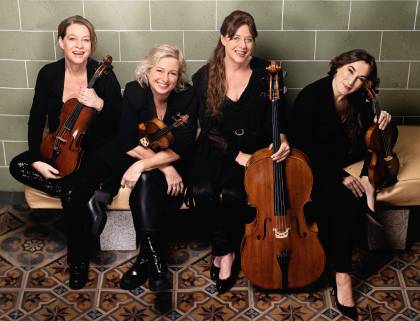The Three Pieces of Stravinsky were written in 1914, and for their time, they were certainly revolutionary. From the opening bars, I realised that the Vertavo Quartet knew this material not only intimately, but actually identified with it. They knew exactly how to adapt to the character of each piece … Absolute genius!
Mundoclásico
They are a group of the highest order; equipped with all the qualities that the best quartets should have.
Nobuhiro Ito, Asahi Evening Newspaper
They have a sense of synthesis that comes of playing together for so long and so frequently, and a young energy that renders their highly polished sound to be elegant without being stuffy.
Rebecca C Howard, Desert Morning News, Salt Lake City
The whole concert was treasurable, the musicianship impeccable, and over all shone the extraordinary beauty of the Vertavo players' tone. May the quartet return, soon and often.
Philippa Kiraly, Seattle Post Intelligencer
The quartet went on to show off its credentials in Grieg's intensely lyrical Quartet No. 1. Soulful and with moments of haunting beauty, this work of melodic inspiration received a singularly compelling reading, its Nordic soul warm and plangent. Vertavo brilliantly brought out the work's almost symphonic yearnings, and capture with conviction, the piece's singing character. With dizzying shifts in dynamics and an emphasis on sharp contrasts, this in its own fashion was as challenging s the riotous Bartok that has preceded it.
J.H. Stape, Vancouver Post
Having followed the career of the young Norwegians since they walked away with every prize on offer at the Melbourne competition a decade ago, their long overdue first visit to Sheffield confirms the Vertavo's status among today's top five string quartets. Their playing is so unfussy and devoid of showmanship, but is blessed with the most perfect technique and faultless intonation. They are an impeccable ensemble with inner transparency and, above all, the desire to be part of a team.
David Denton, Yorkshire Post
From the very first bar, the listener was drawn in and carried along by the energy that the Vertavo Quartet invested in every phrase. The four Norwegians wrested an enormous amount of subtlest detail from the pieces through their powerful playing, simultaneously as sensitive and as finely wrought as a spider's web, capable of switching immediately from hammering fortissimo to whispering piano. They played with an extraordinary degree of inner tension that gripped the audience throughout.
Rolf-Peter Diehl, Cellesche Zeitung
Sometimes three minutes are enough to make an audience grateful; grateful for experiencing something so joyful. This is exactly what happened at the performance of the entirely female Vertavo Quartet in the Curio-Haus: in the three-minute melancholic Sarabande by Anatoly Liadow, these charismatic Norwegians seemed to stroke each note tenderly with their bows. They made this somewhat light work sound like a masterpiece through their heartfelt and intense legato and we wished that time could stop. But there was even more show of their proficiency and ability of interpretation to come. With an almost drilling intensity, the musicians performed the sharp and squarely accentuated 9th Quartet by Per Nørgård, which reminds one of Bartok's rhythmical complexity. No less exciting was the second half, when they played Dvorak's Quartet Op 106. Here, the Vertavos created fireworks with their tangible joy in playing: it is moments like these that make music truly magical.
Hamburger Abenblatt
Norway's Vertavo Quartet are fast establishing themselves as one of the freshest and most versatile young quartets around. Their rock and jazz collaborations suggest parallels with the Kronos Quartet, and, like them, the Vertavo have a very distinctive sound. But what impresses most is the integrity and imagination they bring to their playing. There cannot have been many performances of Schubert's Rosamunde Quartet as unremittingly dark as this one. Even the lyrical andante was played with a choked intensity that questioned its innocence, and the trio section of the menuetto was similarly oppressed - a strong rubato dispelling any illusion of security by shifting the ground from under its own feet. The troubled spirit of this work was close to the surface in a way that could appear extreme: when warmth and lyricism are constantly negated, poignancy is also lost. Overall though, there was much to admire, and this was a performance with real vision. But it was in Janacek's First Quartet that they came into their own. Based on Tolstoy's Kreutzer Sonata, the work oscillates between irrational violence and fragile tenderness. With phenomenal expressive flexibility, the Vertavo moved from warmest sensuality to knife-edge brittleness. The real revelation came at the end, where a sudden move to the major almost suggests a final uplift. It resonated with a anguished, insane hysteria that made a shattering impact.
Pauline Fairclough, The Guardian
But the Norwegians with their flair, their physicality and their communicative urgency, were the most compelling chamber ensemble I have heard in years.
Norman Lebrecht, The Daily Telegraph
Present, enormously together, the whole time mentally and musically on the edge: every tone, every phrase had this little extra kick and twist giving the music form and colour.
Peter Larsen, Bergens Tidende
But the garlands must go to the Vertavo Quartet, an all-female ensemble from Norway. They threw themselves at the Bartók Fourth Quartet, taking its ferocious difficulties in their stride with a raw, primal force that immediately raised the hairs on the neck.
Martin Anderson, The Independent
The audience sat gobsmacked as the dying echo of Beethoven's Quartet in C sharp minor faded in the cavernous reaches of the Melbourne Concert Hall on Saturday night ... When everyone came to, the audience reaction was over-the-top by Melbourne standards: people stood, people whistled, people shouted.
